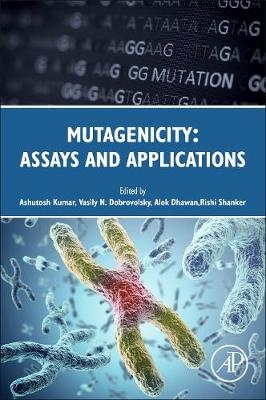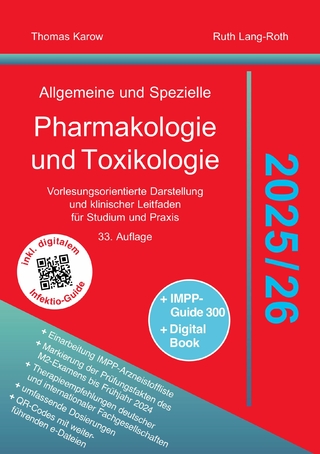
Mutagenicity: Assays and Applications
Academic Press Inc (Verlag)
978-0-12-809252-1 (ISBN)
By providing both important introductory material and practical assays and applications, this book is useful to graduate students, academic and industry researchers and regulators at various stages of their careers, leading to improved risk assessment and regulation.
Ashutosh Kumar works as an Assistant Professor in the Division of Biological and Life Sciences, School of Arts and Sciences, Ahmedabad University, Gujarat, India. He obtained his Master’s degree in Applied Microbiology from Vellore Institute of Technology, Vellore in 2008 and worked at CSIR-Indian Institute of Toxicology Research, Lucknow for his Doctorate degree and was involved in understanding the fate of nanomaterials on biological systems. His current research areas of interest includes, nanomedicines for cancer and arthritis therapy, DNA Biochip for pathogen detection, nanobased drug and gene delivery, nanoemulsions for food industries, environmental nanotechnology and nanotoxicology. Ashutosh has established several new methods for nanomaterial toxicology in India. He developed a novel method for the detection of uptake of nanoparticles in live bacteria for several generations. He also unravelled the mechanism of metal oxide nanoparticles induced genotoxicity and apoptosis in prokaryotic as well as in eukaryotic cells using the state of art techniques such as flow cytometry, electron and confocal microscopy, biochemical enzyme assays, genomics and proteomics. The work conducted by him is in the frontiers of nanomaterial safety area worldwide. His studies shall have far reaching applications in predicting the adverse health effects of nanoparticles and safe use of ENMs to protect human and environmental health. He has published more than 40 research papers and 12 book chapters in internationally reputed peer reviewed journals. He has received several national and international awards including the “INSA Medal For Young Scientist 2014 in the area of Health Sciences, NASI-Young Scientist Platinum Jubilee Award (2015) in the field of Bio-medical, Molecular Biology and Bio-technology, DBT Young Investigator Award, Ahmedabad University - Excellence in Research Award - 2015, among others for his scientific contributions. Vasily N. Dobrovolsky received MS degree in Biotechnology from Moscow Institute of Physics and Technology (Moscow, Russia) and PhD degree in Molecular Biology from the Institute of Bioorganic Chemistry of the Russian Academy of Sciences (IBCh RAS). In 1998, Dr. Dobrovolsky has joined the US Food and Drug Administration as a staff fellow at the National Center for Toxicological Research (Jefferson, Arkansas). Currently as a Senior Scientist, he oversees a group consisting of postdoctoral students, support personnel and staff scientists who are involved in research projects in the field of basic and applied genetic toxicology. His group is using advanced flow cytometry, fluorescence microscopy and next generation sequencing for designing and validating methodologies used for safety assessment of FDA-regulated products. Over the years Dr. Dobrovolsky published over 70 research and scholar articles in peer-reviewed journals and books on detecting in vitro and in vivo mutation, using transgenic and knockout animals in biotechnology and mutation research, characterizing spectra of mutations with high throughput methods. Dr. Dobrovolsky is a member of an influential Genetic Toxicology Technical Committee of the Washington, DC, based Health and Environmental Sciences Institute that advances genetic toxicology and human risk assessment through the international collaboration of experts from industry, government and academia. Professor Alok Dhawan is currently Director, Institute of Life Sciences, Ahmedabad University, Gujarat on lien from CSIR-Indian Institute of Toxicology Research, Lucknow where he is Principal Scientist and Area Coordinator, Nanomaterial Toxicology Group. He obtained his Ph.D. Biochemistry from University of Lucknow, India in 1991. Professor Dhawan started the area of nanomaterial toxicology in the country and published a guidance document on the safe use of nanomaterials. His group elucidated the mechanism of toxicity of metal oxide nanoparticles in human and bacterial cells. His work has been widely cited. He set up a state of the art nanomaterial toxicology facility at CSIR-IITR. He pioneered the identification of peripheral biomarkers of exposure, effect and susceptibility to xenobiotics. Using DNA damage in lymphocytes as a biomarker of exposure, he has established the reference values for DNA damage in healthy Indian population. He also developed and validated Drosophila melanogaster for in vivo genotoxicity assessment. These can have far reaching applications in predicting the adverse health effects of drugs and chemicals on human health. He was instrumental in promoting the cause of alternate to animal models in toxicology including in silico models. Professor Dhawan has won several honours and awards including the INSA Young Scientist Medal in 1994, CSIR Young Scientist Award in 1999 the Shakuntala Amir Chand Prize of ICMR in 2002 and the Vigyan Ratna by the Council of Science and Technology, UP in 2011. His work in the area of nanomaterial toxicology has won him international accolades as well and he was awarded two Indo-UK projects under the prestigious UK-IERI programme. He also has two European Union Projects under the FP7 and New INDIGO programmes. He founded the Indian Nanoscience Society in 2007. In recognition of his work he has been elected Fellow, The National Academy of Sciences, India; Fellow, The Academy of Toxicological Sciences, USA; Fellow, The Academy of Environmental Biology; Fellow, Academy of science for Animal Welfare; Fellow—Society of Toxicology (India), Founder Fellow, Indian Nanoscience Society; Vice President—Environmental Mutagen Society of India (2006–07); Member—National Academy of Medical Sciences. He has to his credit over 100 publications in peer reviewed international journals. Five reviews/book chapters. Four patents, one copyright and the Comet assay website www.cometassayindia.org. He has also been a Guest Editor of a special issue of the journal Nanotoxicology (Supplement 1, 2008) and Volume 3(1) 2009 published by Taylor and Francis group, UK. He has edited a book along with Prof. Diana Anderson entitled The Comet Assay In Toxicology which has been published by The Royal Society of Chemistry, UK under its series on Issues in Toxicology. He is the Editor-In-Chief, Journal of Tranalational Toxicology published by American Scientific Publishers, USA and serves as the Member, Editorial Board of Mutagenesis, Mutation Research Reviews and other journal of repute. Professor Rishi Shanker, currently serves as Consultant to Center for Innovation & Translational Research (CITAR), CSIR-Indian Institute of Toxicology Research, Lucknow and also Advisor to ABC Genomics (India) Private Ltd, Biotechnology Park, Lucknow, India. He has served as Professor & Associate Dean at the School of Arts & Sciences, Ahmedabad University, Gujarat, India (2014-16). Prior to joining Ahmedabad University, he served as Chief Scientist and Area Coordinator – Environmental & Nanomaterial Toxicology Groups at CSIR-Indian Institute of Toxicology Research, Lucknow (2001-2013). He also served as Principal Scientist at CSIR-National Environmental Engineering Research Institute, Nagpur (1991-2001). He obtained his Masters in Biochemistry from University of Lucknow and a PhD in Environmental Microbiology & Toxicology from CSIR-IITR & CSJM University(1985). Dr Shankers’ post-doctoral research addressed methanogen microbiology, deep subsurface microbiology and protein engineering at University of London and Pennsylvania State University, USA (1987-1990). Dr. Shanker’s research contributions range from genetically engineered bacteria for bioremediation and molecular probes for pathogen detection to alternate models in toxicity assessment of chemicals and engineered nanomaterials. He has successfully steered over 34 national and international research projects including Indo-US program: Common Agenda for Environment, Indo-Swiss Program in Biotechnology, Indo-German, EU FP7, EU New Indigo & Inno Indigo program and Unilever. He has more than 80 publications and 20 reviews/book chapters to his credit in aforesaid areas. He has mentored 11 PhD students and 20 research projects of Masters’ students in life sciences. His work on ‘pathogen detection and water quality’ received recognition in form of ‘Vigyan Ratna’, conferred by the Government of Uttar Pradesh, India. He was awarded the Visiting Research Fellowship of Society for General Microbiology, UK at the Anaerobic Microbiology Laboratory, Queen Mary College, University of London. He has served as Visiting Scientist and Visiting Professor at the University of Washington, Seattle, USA; Pasteur Institute & CEA, France; and Pohang University of Science & Technology, Republic of Korea. He is founder fellow of Indian Nanoscience Society and Fellow of Society of Toxicology, India.
1. Mutagenesis and health problems
2. Molecular mechanisms of mutagenesis
3. Bacterial mutation assays
4. Gene mutation assays in cultured mammalian cells
5. Chromosomal aberration test
6. In vivo cytogenetic assay
7. Mutagenicity testing in environmental pollution control
8. Mutagens in food and water
9. Emerging methods for the identification of mutagens
10. Guidelines and registration of the new compounds or drug like molecules
11. Mutagenicity testing, regulatory guidelines and current needs
| Erscheinungsdatum | 13.02.2018 |
|---|---|
| Verlagsort | San Diego |
| Sprache | englisch |
| Maße | 152 x 229 mm |
| Gewicht | 570 g |
| Themenwelt | Studium ► 2. Studienabschnitt (Klinik) ► Pharmakologie / Toxikologie |
| Naturwissenschaften ► Biologie ► Biochemie | |
| ISBN-10 | 0-12-809252-1 / 0128092521 |
| ISBN-13 | 978-0-12-809252-1 / 9780128092521 |
| Zustand | Neuware |
| Haben Sie eine Frage zum Produkt? |
aus dem Bereich


